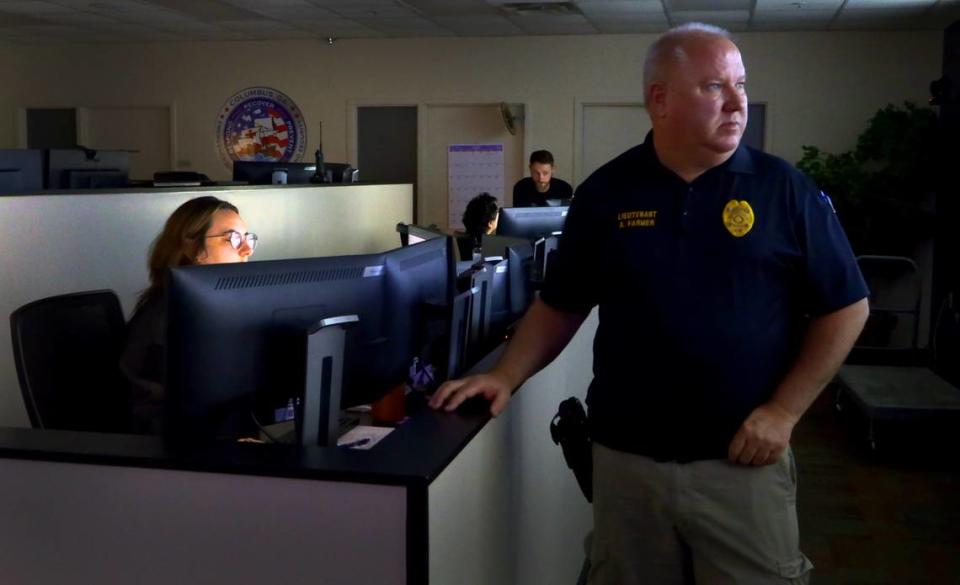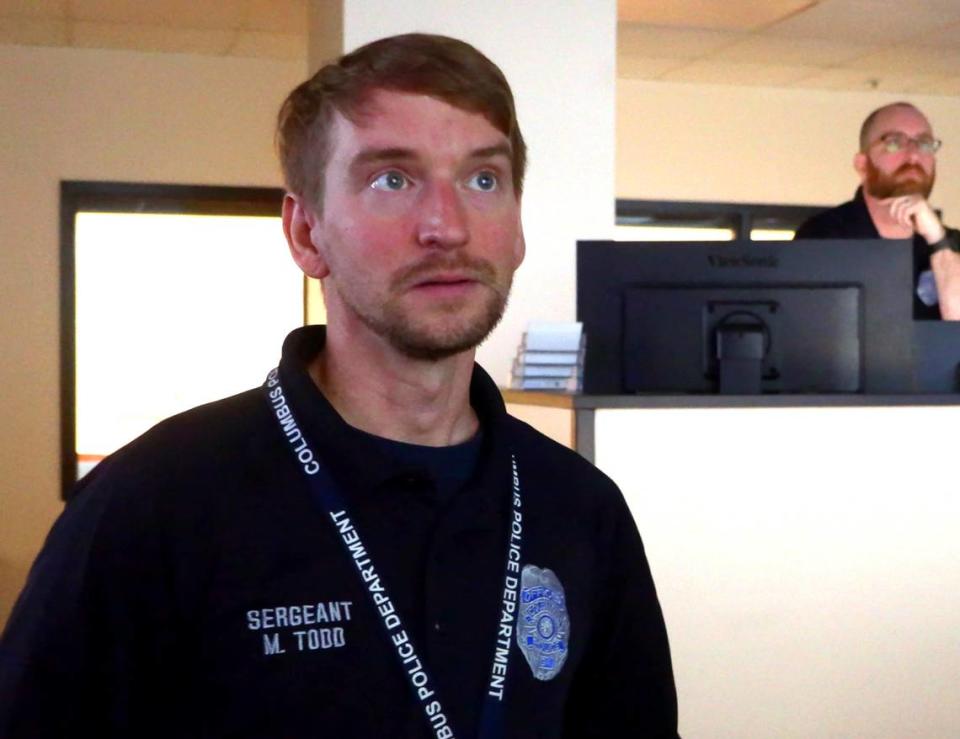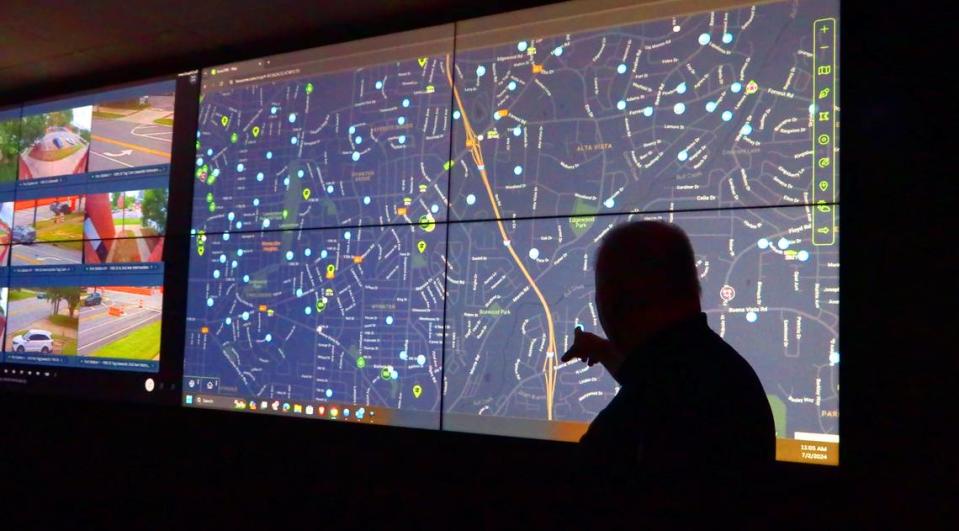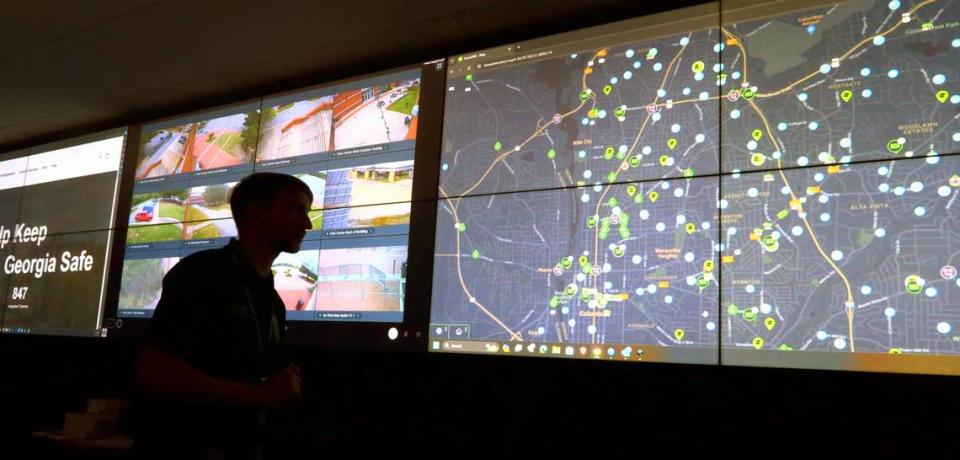Look inside Columbus police unit helping to solve murders & other crimes — with video
When Columbusites call for help, a little known unit springs into action to help.
This eight-person team that comprises CPD’s Real Time Crime Center (RTCC) monitors the computer-aided dispatch system, which is how 911 calls are handled by first responders.
The RTCC staff’s primary responsibility is to monitor the computer aided dispatch system, which is how 911 calls are handled by emergency responders. Lt. Andy Farmer, who oversees the unit, said the system’s camera access makes potentially life-threatening situations much safer.
“We are able to look in on those cameras and sometimes detect what’s going on before the police actually arrive,” he said. “We can communicate with the officers responding and give them a preview of what they’re coming up on.”

Sgt. Max Todd, who has worked at the RTCC more than three years, said the unit’s video assistance to patrol officers has been crucial for the safety and lives of countless Columbusites, including the officers themselves.
“There’s a lot of ‘what-ifs’ taken out of the response,” he said.

Farmer said the live surveillance can also lead to faster suspect apprehension because the officers and analysts can track the movement of people involved in crimes through the department’s expansive surveillance access.
In addition to providing real-time support as 911 calls come in, the RTCC also helps investigators look into the past for the evidence they need to close a case.
The RTCC after a crime
Farmer said the majority of the RTCC’s responsibility lies in reviewing 911 calls and cross-referencing the information with the over 3,000 cameras feeding the unit live footage.
Beyond the cameras the RTCC has constant access to, like the ones on government properties and housing authority buildings, Farmer said his team can request footage from homeowner cameras registered through the Connect Columbus program.
“We don’t have access to their cameras,” he said. “But we would ask them to review their video footage ... and see if they have anything that might help us.”

Farmer said home surveillance systems have been pivotal in solving crimes across the city, including car accidents, break-ins and at least one murder. Even if a camera doesn’t help solve a specific crime, he said they all contribute to the department’s data.
“We use a lot of data-driven statistics to help us hone in on hot spots or a certain area’s crime statistics,” he said. “We can detect patterns.”
Farmer said some housing areas are crime hot spots, including the Wilson Apartments, where “significant video evidence” helped convict a Columbus man of murder in February.
The case involved a June 2021 fatal shooting at the apartments that left Marcel Samedi, 21, dead. Throughout the course of the trial, Columbus Police officers testified to surveillance captured by the RTCC that showed the shooting.
The RTCC in the future
Farmer said the RTCC has major strengths, but it will never completely replace police officers.
“It’s always better to have more boots on the ground,” he said. “I definitely think technology is the way of law enforcement in the future, but I don’t think it’ll ever replace the actual officers. It’ll just be an added tool to the ones that they already have.”
The RTCC’s tools will be at the disposal of CPD officers before the end of the month. The unit plans on distributing the camera registry map it uses to preview potentially dangerous situations to patrol officers.
The map includes cameras from businesses, license plate readers and more, but Todd said the unit’s goal for the future is further expansion in the city.

“We want more business integration and traffic cameras, especially at larger intersections,” he said.
Farmer said the work done in the RTCC is absolutely essential for the safety of Columbus.
“The whole gamut of crimes has been investigated through the Real Time Crime Center,” he said. “They say a picture is worth a thousand words. Video’s worth even more than that.”


